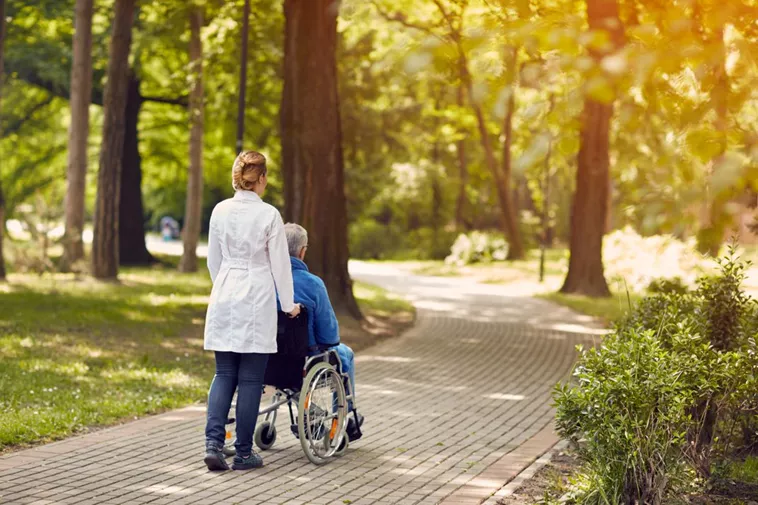What is Mandatory Training for Care Workers?
So, what qualifications do you need to be a care worker? While care workers don’t need any particular GCSEs, A-Levels or degrees to work in care, there will be qualifications that the team should have to provide care in the UK, as well as mandatory training to keep their skills up to date. Mandatory care training is the training that managers are expected to provide to their staff to follow statutory requirements. This includes the Health and Safety at Work Act, local authority requirements and CQC rules.
Every care service has the legal responsibility to provide staff with a level of Health and Safety awareness training, such as ‘Fire Safety’. ‘Moving and handling’ training will also class as mandatory. And if staff are involved with meal preparation or work with food, then they must participate in Food Safety and Hygiene training. These are all perfect examples of care mandatory training.
If you are a care manager trying to ensure that your care team are fully up to date with the highest level of training, but you feel overwhelmed and don’t know where to start, we have put together this guide on mandatory training for care workers so that you know exactly what is required.
At Access, we have over 20 years experience working with a huge range of care services, including by helping them deliver better value, more effective learning and training with our health and social care eLearning solution. This digital solution includes all core and mandatory training for care workers and much more.
Working with all these providers, putting together and constantly improving all our digital care training content has taught us a thing or two about training in the sector, so the articles we write on the subject should have all the answers you need.
Core and Mandatory Training in Health and Social Care
While people don’t need any specific care worker qualifications to work in the care sector, there is mandatory care training requirements in health and social care. You can see more information on each topic, minimum learning obligations and suggested refresher frequency below:
Assisting and Moving People
In most cases, assisting and moving people will depend on the worker’s role and responsibilities. Appropriate training should be provided to enable the worker to:
- Be able to move and position an individual safely.
- Use any equipment that may be required.
- Understand the current legislation, national guidelines, policies, procedures and protocols concerning moving and positioning individuals.
- Understand the physiology and anatomy of moving and positioning individuals.
- Be able to minimise risk before moving and positioning individuals.
- Know when to seek advice and/or assistance from others when moving and positioning individuals.
This will fall under the CQC fundamental standards (safety). It’s recommended that learning, knowledge and competency be refreshed and assessed at least once a year, as well as when a new risk is introduced.
Basic Life Support and First Aid
All care staff should have basic life support and first aid training. Basic life support knowledge includes understanding and knowing how to follow procedures for responding to accidents and sudden illness. Caregivers should also be able to provide basic life support. When it comes to first aid, in most cases, the awarding organisation will set the minimum learning outcome for this skill.
This knowledge falls under the CQC fundamental standards (safety). Establishments are responsible for providing adequate personnel to respond if someone is taken ill or injured at work. It’s the employer’s responsibility to determine how many people will require training and to what level.
Skills for basic life support should be refreshed at least annually. Learning and development should be provided when identified or required. On the other hand, first aid training should be refreshed at least every 3 years to be recognised and seen as competent.
Communication
Being a good communicator is an essential skill for care workers. They must understand why communication in health and social care is important when working with colleagues, and to be able to meet the communication and language needs, preferences and wishes of individuals. This will allow them to reduce barriers to communication. They must also be able to apply principles and practices relating to confidentiality at work.
Communication falls under the CQC fundamental standards (person-centred care, dignity and respect). Employers must monitor performance and assess knowledge and competence yearly. They should also provide learning and development opportunities at least every 3 years and when required or identified.
Dignity
All care workers must understand the principles that underpin dignity in care. This will allow them to maintain the dignity, respect and privacy of their service users.
This will fall under the CQC fundamental standards (dignity and respect). Employers must monitor their staff performance and assess knowledge and competence at least annually. Learning and development opportunities must be provided every 3 years and when their necessity has been identified or required.
Equality and Diversity
The importance of inclusion equality and diversity must be understood by all members of staff. They must be able to work inclusively and know how to access vital information, advice and support regarding equality, diversity and inclusion.
This will class as the CQC fundamental standards (dignity and respect, and safeguarding from abuse). Similar to communication and dignity, equality and diversity performance must be monitored and knowledge and competence must be assessed at least every year. Employers must provide learning and development opportunities when identified or required, and at least every 3 years.

Fire Safety
Fire safety is extremely important. Not only does it ensure the safety of your service users, but it also protects your employees and the building. You should make sure everyone in your care service understands and knows how to promote fire safety in the work setting.
Understandably, this classes as the CQC fundamental standard (safety). BS 9999:2008 Code of practice for fire safety in the design management and use of buildings recommends that training is refreshed at least once a year. The Department for Communities and Local Government will provide advice on meeting legislative requirements. Fire drills should also be completed annually.
Food Hygiene
If your caregivers are working with food, then they must understand the importance of food safety measures when providing food and drink for individuals. They should also be able to:
- Maintain hygiene when handling food and drink.
- Meet safety requirements when preparing and serving food and drink to individuals.
- Meet safety requirements when cleaning up food and drink.
- Store food and drink safely.
- Know how to access additional advice or support surrounding food safety.
This training will fall under CQC fundamental standards (premises and equipment, and safety). All workers that are involved in handling, preparing or provision of food are required by law to have received the right training on how to handle food safety.
Their performance must be closely monitored and their knowledge and competence should be assessed annually. Learning and development opportunities must be provided at least every 3 years, and when identified or required.
Health and Safety Awareness
Health and safety will protect your workers, reduce absences and ensure that your workplace is more productive and efficient. When it comes to health and safety in the work setting, your team should understand their responsibilities, as well as the responsibilities of others. They must understand how to use risk assessments, handle hazardous substances, implement security measures in the workplace and manage stress.
This will fall under the CQC fundamental standard (safety). Performance must be monitored. Employers should assess knowledge and competence at least once a year and learning and development opportunities should be on offer every 3 years, as well as when they’ve been identified or required.
Infection Prevention and Control
In care, you must prevent and reduce the transmission of infectious diseases. This is so essential because it ensures that people stay healthy. Care providers must understand:
- Own and others' roles and responsibilities in the prevention and control of infections.
- Legislation and policies relating to the prevention and control of infections.
- The importance of risk assessment in the relation to the prevention and control of infections.
- The importance of using Personal Protective Equipment (PPE) in the prevention and control of infections.
- The importance of good personal hygiene in the prevention and control of infections.
This will class as the CQC fundamental standard (premises and equipment). Employers should monitor performance and assess knowledge and competence at least annually. Learning and development opportunities should be provided every 3 years and when they’re identified or required.
Medication Management
In care, fully understanding medication management is crucial. This is the process of overseeing the medications that have been prescribed to service users to ensure that they are taken correctly, so they can achieve their planned outcome. Care workers must understand:
- Legislation, policies and procedures that are relevant to the administration of medication.
- Common types of medication and their use.
- Procedures and techniques for the administration of medication.
- How to prepare for the administration of medication.
- How to administer and monitor medication safely.
Additional training where required will include how to administer specific medicines (such as patches, creams, eye drops, liquids and inhalers) and specifical training for specific medications e.g. Buccal midazolam. All of this training will fall under the CQC fundamental standard (safety).
NICE recommends that learning for care home staff and community-based staff is refreshed, and knowledge and competence get assessed annually. Learning and development requirements will be determined by the worker's role and responsibilities. Training and competency checks must be relevant to the type of service provision and agreed responsibilities.
Please remember that workers shouldn’t manage or administer medicines until they have been fully trained and assessed for any training needed.

Mental Capacity and Liberty Safeguards
Care workers should understand the legal frameworks, policies and guidelines when it comes to mental capacity and liberty safeguards. They should also understand the meaning of mental capacity concerning how care is provided.
This falls under the CQC fundamental standards (person-centred care and consent). Performance must be monitored and knowledge and competence should be assessed yearly. Every 3 years, learning and development opportunities should be provided. Alternatively, they should be offered when identified or required.
Moving and Handling Objects
Caregivers need to be able to move and handle equipment and other objects safely to prevent injury to themselves and others.
This is classed as CQC fundamental standard (safety). HSE research has found that annual refresher training is generally considered good practice.
Nutrition and Hydration
All care providers should understand the principles of hydration and nutrition to ensure the safety of their service users. The care team must be able to support individuals to have access to fluids per their plan of care. They should also have the ability to offer individuals access to food and nutrition following their plan of care.
This is classed as CQC fundamental standard (food and drink). It’s recommended that performance is monitored and knowledge and competence are assessed annually. Every 3 years and when identified or required, learning and development opportunities should be provided.
Oral Health
The importance of oral health is often overlooked, but you must ensure care staff who provide daily personal care understand:
- The importance of oral health and the potential effect on their general health, well-being and dignity.
- The potential impact of untreated dental pain or mouth infection on the behaviour, general health and well-being of people who cannot ask for help, or articulate their pain or distress.
- How and when to reassess oral health.
- How to deliver daily mouth care.
- How and when to report any oral health concerns, and how to respond to a person’s altering needs and circumstances.
- The importance of denture marking and how to arrange this for people (with their permission).
This will fall under the CQC fundamental standards (person-centred care, dignity and respect). CQC recommends that oral health should be part of mandatory staff training. The performance must be monitored and an annual assessment for knowledge and competence is advised. Learning and development opportunities should be provided every 3 years and when identified or required.
Person-Centred Care
Care teams must understand person-centred approaches to care and support. They must be able to work in a person-centred way, establish consent when providing care and support, and encourage active participation. Care providers must be able to support an individual’s right to make choices and their well-being.
This falls under the CQC fundamental standards (person-centred care, dignity and respect). Managers should monitor performance and assess knowledge and competence at least annually. They should provide learning and development opportunities every 3 years and when identified or required.

Recording and Reporting
Records and reports are required as they help boost teamwork and protect the health and well-being of individuals. Care teams must understand the need for secure handling of information in settings, know how to access support for handling information, and how to handle this information in accordance with agreed ways of working.
Recording and reporting classes as CQC fundamental standards (complaints and good governance). Performance must be monitored by management. As well as a yearly assessment of knowledge and competency, learning and development materials should be provided every 3 years and when identified or required.
Safeguarding Adults
Safeguarding will protect the service user's health, well-being and human rights. This is essential and ensures they get to live free from harm, neglect and abuse. Care workers must understand:
- How to recognise types of abuse.
- How to respond to suspected or alleged abuse.
- The national and local context of safeguarding and protection from abuse.
- Ways to reduce the likelihood of abuse.
- How to recognise and report unsafe practices.
- Principles for online safety.
- How to make links between safeguarding and domestic violence.
This classes as CQC's fundamental standard (safeguarding from abuse). Annual assessment of knowledge and competence is recommended as well as performance monitoring. It’s advised that learning and development materials are provided every 3 years and when identified or required.
Specific Conditions
Care workers must understand the needs and experiences of individuals with specific conditions. They must also understand:
- The importance of promoting positive health and well-being of individuals with specific conditions.
- The adjustments which may be necessary for care delivery relating to specific conditions.
- The legal frameworks, policies and guidelines relating to specific conditions.
- How to support individuals with specific conditions.
This will class as CQC fundamental standard (staffing). Knowledge and competence must be assessed annually and performance should be monitored. Every 3 years and when required or identified, learning and development opportunities should be offered.
The Most Common Mandatory Training for Domiciliary Care Workers
The table below has been created to highlight the main subjects recognised as the most common mandatory training for domiciliary care workers:
|
Type of Training |
Requirement Source |
|
Health and Safety |
· Statutory requirement (Health and Safety at Work Act 1974) |
|
Fire Safety |
· Statutory requirement (Health and Safety at Work Act 1974) · Regulatory Reform (Fire Safety) Order 2005 |
|
Equality, Diversity and Human Rights |
· Human Rights Act 1998 and Equality Act 2010 |
|
Infection, Prevention and Control |
· Health and Social Care Act 2008: · Code of Practice on the Prevention and Control of Infection and Related Guidance (Dec 2010) |
|
Manual Handling |
· Manual Handling Operations Regulations 1992 · Management of Health and Safety at Work Regulations 1999 |
|
Safeguarding Adults |
· CQC/Care Inspectorate Scotland/Care Inspectorate Wales/RQIA |
|
Safeguarding Children |
· CQC/Care Inspectorate Scotland/Care Inspectorate Wales/RQIA |
CQC Mandatory Training for Care Workers
The CQC (Care Quality Commission) is the independent regulator for health and social care in England. Each national regulator (Care Inspectorate Scotland, Care Inspectorate Wales and the RQIA in Northern Ireland have similar requirements and guidance around required training for care staff and relevant regulations around recruiting staff and staffing levels.
Each national regulator offers extensive guidance to ensure care providers meet the terms of regulations, so we would advise you consult this for clarity on any matters related to staffing. To give you an overview, when it comes to safe staffing, the CQC requires health and social care providers to:
- Have the right number of professional workers who are fully qualified and competent with the suitable skills and experience required to meet the needs of their service users.
- Provide care staff with the right support, professional development, training, appraisals and supervision that are necessary for them to fulfil their role and responsibilities.
- Offer support to care staff to gain further qualifications and provide evidence (where needed) to the appropriate regulator to show that they meet the professional standards required to practice.
If these components are not in place or if a social care provider doesn’t provide satisfactory evidence that they will comply, then the CQC has the power to take regulatory actions. This includes refusing the registration of the provider.

How Long Does Mandatory Training Take for Care Workers
There isn’t really a timeframe for mandatory training, as long as the refreshers are completed as and when they are due and you keep up to CQC standards.
However, most support workers must complete the Care Certificate program. On average, the Care Certificate takes around 12 weeks to complete. This training provides the framework caregivers need to ensure they all have the same introductory skills, knowledge and behaviours that allow them to provide safe, compassionate and high-quality care and meet the minimum UK standards of care.
Keeping on Top of Mandatory Training for Care Workers
To summarise, while there is no single list of mandatory courses which would apply to every care provider, training is defined as mandatory if it falls into a statutory requirement, if all staff across the organisation require the training or if it’s a regulatory (for example the CQC in England) or local authority requirement. A qualified in-person trainer or an up-to-date eLearning platform will often highlight the subjects considered mandatory.
If you’re looking for an engaging online platform endorsed by Skills for Care, then you should consider eLearning for Health and Social Care by The Access Group. It is a more cost-effective, flexible and engaging solution to training and developing your care staff. With over 30 years of experience digitising a wide range of businesses, no task is too big or too small for us and our complete suite of care solutions means digitising your care business can all be accomplished through one experienced supplier.
For those struggling to get training right in their care service, we have put together this informative learning and development guide for care workers. This guide dives into the top challenges care services face when it comes to learning and development and how to successfully overcome them.
You can learn more about our unique eLearning for health and social care courses on our website. If you would like to speak to someone directly, feel free to get in touch with us today.



